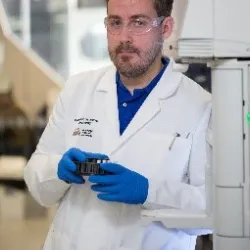Dr Lee Alissandratos

Content navigation
About
Apostolos (Lee) gained his first degree in ChemEng (MSc) with a Diploma in Biotechnology at the National Technical University of Athens (Ethnicon Metsoveion Polytechneion) for which he was awarded the Thomaidion prize.
He then moved to Scotland and the University of Strathclyde to carry out his doctoral studies on a BASF PhD studentship funded through the Centre of Excellence in Biocatalysis (University of Manchester), and supervised by Peter Halling (Strathclyde) and Sabine Flitsch (Manchester).
Following his PhD award, he undertook mandatory Greek national service and was stationed at the Army Chemical Laboratories (ELOT, ISO standardisation).
Lee then moved to Australia to work with Chris Easton at the Australian National University (RSC) on Industrial & Environmental Biocatalysis projects. These were funded primarily through the CSIRO Biofuels Cluster (Energy Transformed Flasgship) and the Grains Research & Development Corporation.
Since then he has expanded his research into the field of diagnostics for Health and Biosecurity and is currently CSIRO Synthetic Biology Future Science Fellow at ANU.
Affiliations
- Chemical Biology, Member
Research interests
The use of Biocatalysis and Synthetic Biology to create real-world solutions for some of the most pressing global issues : Global Health, Biosecurity, Energy security, Sustainable chemical processes.
Areas of expertise
- Enzymes
- Biocatalysis And Enzyme Technology
- Bioprocessing, Bioproduction And Bioproducts
- Medical Biotechnology Diagnostics (Incl. Biosensors)
- Agricultural Biotechnology Diagnostics (Incl. Biosensors)
- Environmental Biotechnology Diagnostics (Incl. Biosensors)
- Bioremediation
Researcher's projects
Biocatalysis for sustainable chemical processes
We are employing Synthetic Biology to develop new Biocatalysis platforms that will allow application of multi-enzymatic cascades as replacements for unsustainable fossil-based processes. This includes engineering of new and improved enzyme activities using renewable substrates (e.g. CO2, ammonia), optimisation of cofactor-dependent biotransformations, and development of new tools for control of multi-enzymatic reactions in vitro (cell-free metabolic engineering) and in whole-cell. Bioproducts targeted range from platform chemicalsand fuels to green fertilisers to fine chemicals and biologics (therapeutics).
"Just-add-water" nucleic acid amplification
The use of Synthetic Biology to assemble biological components into customised useful devices is now a reality. We are employing these principles for the delivery of bio-devices that carry out pathogen nucleic acid amplification and formulating these into stable "just-add-water" formats to produce novel user-friendly, low-cost diagnostic kits that may be applied within primary laboratory settings and at point-of-care. We aim to deliver real-world solutions that may be utilised in low-tech settings in the developing world and remote Australia.
DNA biosensors
DNA-based biotechnologies are rapidly forming a new landscape in the world of technology and innovation. However accurate identification of a specific DNA-sequence (e.g. as produced through nucleic acid amplification) still requires high-end equipment and complex protocols. Together with colleagues at the CSIRO (Health & Biosecurity) we are harnessing the power of biological recognition for the production of new biosensors that are able to rapidly identify specific ds-DNA sequences. These allow accurate detection/quantitation of a target DNA sequence and are amenable to application with low-cost analytical technologies in primary laboratories and at point-of-care.
Projects and Grants
- Synthetic biology devices for streamlined nucleic acid amplification and detection at point-of-care (Primary Investigator)
- Just-add-water nucleic acid amplification (Primary Investigator)
Related websites
- https://gcgh.grandchallenges.org/grant/just-add-water-nucleic-acid-amplification - Bill & Melinda Gates Foundation summary of awarded grant
- https://research.csiro.au/synthetic-biology-fsp/2018-future-science-fellowships-announced/
- http://chemistry.anu.edu.au/research/highlights/apostolos-lee-alissandratos-csiro-future-science-fellowship-synthetic-biology
Publications
- Hennessy, J, Latter, M, Philbrook, A et al 2018, 'Hyperthermophilic Carbamate Kinase Stability and Anabolic In Vitro Activity at Alkaline pH', Applied and Environmental Microbiology, vol. 84, no. 3, pp. 1-13pp.
- Alissandratos, A, Caron, K, Loan, T et al 2016, 'ATP Recycling with Cell Lysate for Enzyme-Catalyzed Chemical Synthesis, Protein Expression and PCR', ACS Chemical Biology, vol. 11, no. 12, pp. 3289-3293.
- Alissandratos, A & Easton, C 2015, 'Biocatalysis for the application of CO2 as a chemical feedstock', Beilstein Journal of Organic Chemistry, vol. 11, pp. 2370-2387.
- Alissandratos, A, Kim, H & Easton, C 2014, 'Formate production through carbon dioxide hydrogenation with recombinant whole cell biocatalysts', Bioresource Technology, vol. 164, pp. 7-11.
- Alissandratos, A, Kim, H, Matthews, H et al 2013, 'Clostridium carboxidivorans strain P7T recombinant formate dehydrogenase catalyzes reduction of CO2 to formate', Applied and Environmental Microbiology, vol. 79, no. 2, pp. 741-744.
- Philbrook, A, Alissandratos, A & Easton, C 2013, 'Biochemical processes for generating fuels and commodity chemicals from lignocellulosic biomass', in M. Petre (ed.), Environmental Biotechnology - New Approaches and Prospective Applications, InTech Open Access Publisher, Rijeka, Croatia, pp. 39-64.
- Alissandratos, A, Kim, H & Easton, C 2013, 'Formate production through biocatalysis', Bioengineered, vol. 4, no. 5, pp. 348-350.
- Alissandratos, A & Halling, P 2012, 'Enzymatic acylation of starch', Bioresource Technology, vol. 115, pp. 41-47.
- Alissandratos, A, Baudendistel, N, Hauer, B et al 2011, 'Biocompatible functionalisation of starch', Chemical Communications, vol. 47, no. 2, pp. 683-685.
- Alissandratos, A, Baudendistel, N, Flitsch, S et al 2010, 'Lipase-catalysed acylation of starch and determination of the degree of substitution by methanolysis and GC', BMC Biotechnology, vol. 10, pp. 82-82.
- Vafiadi, C, Topakas, E, Alissandratos, A et al 2008, 'Enzymatic synthesis of butyl hydroxycinnamates and their inhibitory effects on LDL-oxidation', Journal of Biotechnology, vol. 133, no. 4, pp. 497-504.
